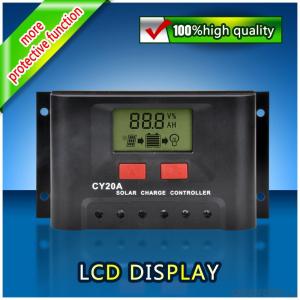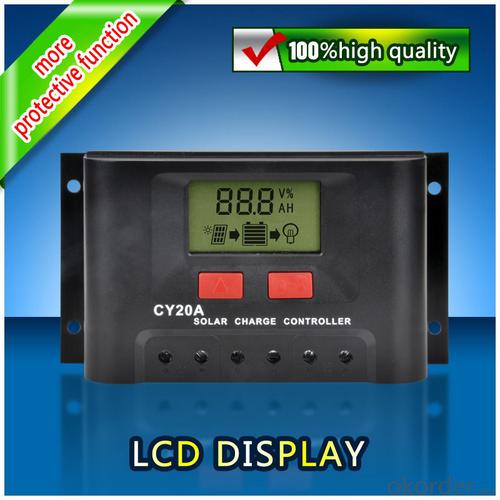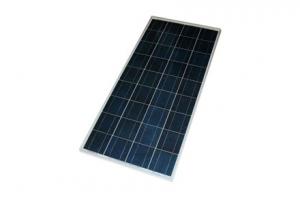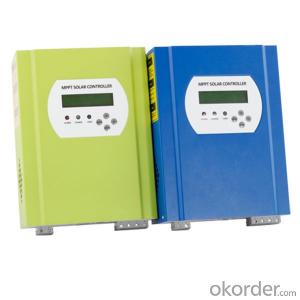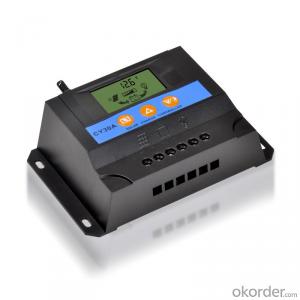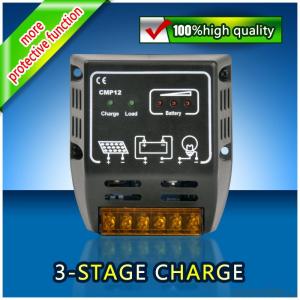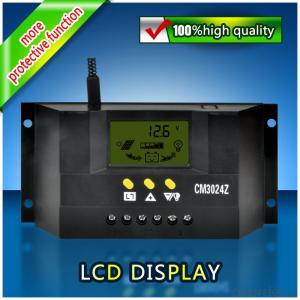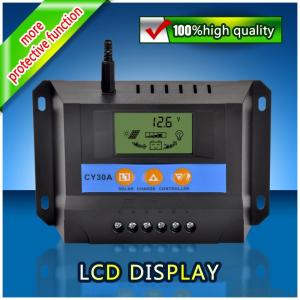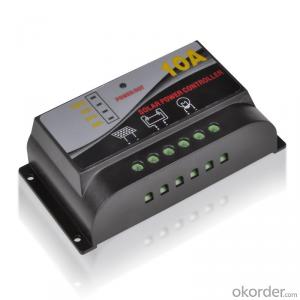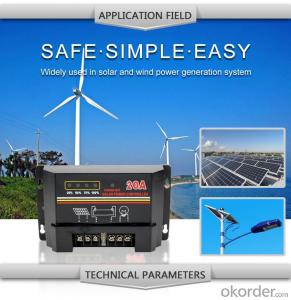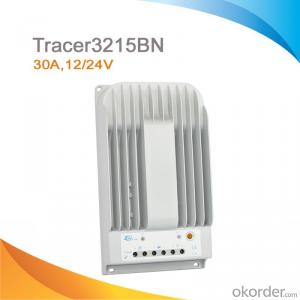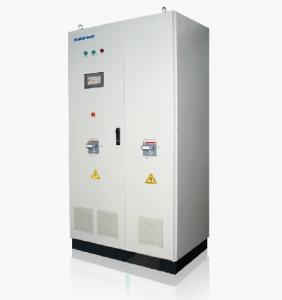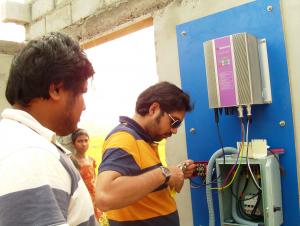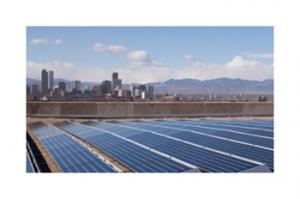Pentair Solar Poll Controllers - Solar LCD Controller CY20A with the Best Price
- Loading Port:
- China main port
- Payment Terms:
- TT or LC
- Min Order Qty:
- 1 unit
- Supply Capability:
- 10000 unit/month
OKorder Service Pledge
OKorder Financial Service
You Might Also Like
Product Introduction
Solar controller is control device which can control solar panel and transform solar energy into electricity then store to the battery bank. Solar controller is the most important part in offgrid system, whose performance has much effect on life expectancy and operation of the whole system, especially the battery expectancy.
Application Areas
Standalone Photovoltaic power station
Standalone Domestic household photovoltaic power system
Mobil communication base stations, expressway and other non-residential regions.
Coastal islands, remote mountainous, border posts for regions shortage of or without electricity.
Government demonstration projects, landscape lighting project etc.
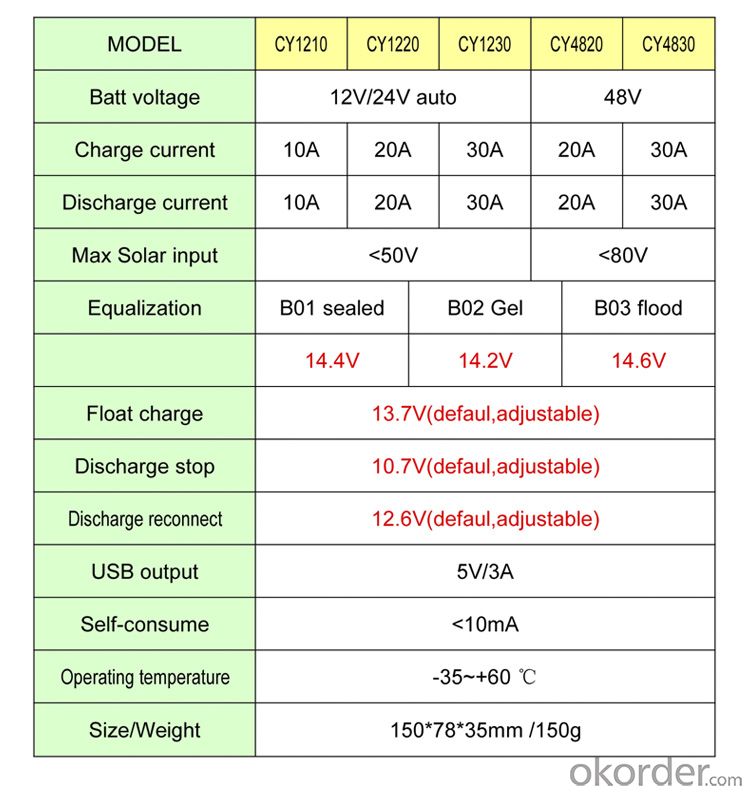
Selection of high-quality materials properties be consistent from beginning to end
For life is a convenient
A little more secure
The innovation design idea of the perfect show
The first set of people-oriented
The high-end configuration components
- Q: Can a solar controller be used with a solar microinverter system?
- No, a solar controller cannot be used with a solar microinverter system. Solar microinverters are designed to convert the DC power generated by individual solar panels into AC power directly at the panel level, whereas a solar controller is used to regulate and control the charging of batteries in a solar system. These two components serve different purposes and are not compatible with each other.
- Q: Can a solar controller be used with a battery bank that is connected in series?
- Yes, a solar controller can be used with a battery bank that is connected in series. The solar controller is responsible for regulating the charging and discharging process of the batteries, regardless of whether they are connected in series or parallel. It ensures that the batteries are charged efficiently and protected from overcharging or discharging.
- Q: Can a solar controller handle power fluctuations from appliances?
- Yes, a solar controller is designed to handle power fluctuations from appliances. It regulates and stabilizes the power output from solar panels, ensuring a consistent and safe supply of electricity to appliances, even during fluctuations in power generation.
- Q: What is the maximum power output a solar controller can handle?
- The maximum power output that a solar controller can handle depends on its specifications and capabilities. It can vary from controller to controller, but typically ranges from around 10 to 60 amps, allowing for a maximum power output of 120 to 1440 watts, respectively. However, it is important to refer to the specific specifications of the solar controller in question for an accurate determination of its maximum power handling capacity.
- Q: Can a solar controller be used with solar panel fire detection systems?
- Yes, a solar controller can be used with solar panel fire detection systems. A solar controller is responsible for regulating the voltage and current that flows between the solar panels and the battery or load. It ensures that the solar panels are operating at their optimum level and protects the system from overcharging or undercharging. In the context of solar panel fire detection systems, the solar controller can play a crucial role in managing the power supply to the detection system. It can ensure that the solar panels are generating enough power to operate the detection system effectively while also preventing any damage to the system due to overvoltage or power fluctuations. Additionally, a solar controller with advanced features such as temperature monitoring and fault detection can provide an added layer of safety to the fire detection system. It can detect any anomalies or malfunctions in the solar panels or the overall system and take necessary actions to prevent any potential fire hazards. Therefore, integrating a solar controller into a solar panel fire detection system can enhance its performance, efficiency, and safety by ensuring proper power management and protection.
- Q: Can a solar controller be used with a solar-powered outdoor Wi-Fi system?
- Yes, a solar controller can be used with a solar-powered outdoor Wi-Fi system. A solar controller helps regulate and monitor the charging and discharging of the solar battery, ensuring maximum efficiency and protection. It can be integrated into the system to manage the power supply from the solar panels, providing a reliable and sustainable energy source for the outdoor Wi-Fi system.
- Q: Can a solar controller be used with solar-powered indoor lighting systems?
- Yes, a solar controller can be used with solar-powered indoor lighting systems. A solar controller regulates the flow of electricity from the solar panels to the batteries, ensuring efficient charging and preventing overcharging. This is beneficial for indoor lighting systems as it helps optimize the use of solar energy and prolongs the battery life.
- Q: How do I connect a solar controller to a solar-powered water heater?
- To establish a connection between a solar controller and a solar-powered water heater, a series of steps must be followed: 1. Identification of the solar controller is the first step. This device regulates the energy flow from the solar panels to the water heater. It is typically situated in close proximity to the solar panels and possesses various input and output terminals. 2. The type of solar controller needs to be determined. There are several options available, including PWM (Pulse Width Modulation) and MPPT (Maximum Power Point Tracking). It is important to ensure that the appropriate controller for your system is obtained. 3. The location of the water heater must be determined. The input and output terminals of the water heater are usually labeled as "inlet" and "outlet". 4. The solar panels need to be connected to the input terminals of the solar controller. The manufacturer's instructions should be followed carefully to ensure proper wiring, and it is essential to ensure that the positive and negative terminals are connected correctly. 5. The outlet terminals of the solar controller should be connected to the inlet terminals of the water heater. Once again, the manufacturer's instructions should be consulted for accurate wiring. 6. Configuration of the solar controller may be necessary based on the specific requirements of your system. This may involve the adjustment of temperature limits, flow rates, or other parameters. 7. The system should be tested after the connections and configuration are complete. This is to verify that the system is functioning correctly. Monitoring the water temperature and flow will indicate whether the solar controller is effectively heating the water. Always remember to consult the user manual or seek professional assistance if any step is unclear or if there are any concerns. It is crucial to prioritize safety precautions when working with electrical components.
- Q: Can a solar controller be used with a solar-powered satellite navigation system?
- Utilizing a solar controller in a solar-powered satellite navigation system enables the efficient utilization of the system. The solar controller, also referred to as a charge controller, is responsible for regulating the flow of electricity from the solar panels to the batteries. Its primary function is to ensure the batteries are charged effectively while preventing any potential damage caused by overcharging. The solar panels in this system are utilized to generate electricity by harnessing the energy emitted by the sun. The electricity produced is then stored in batteries, allowing for its usage during periods of insufficient sunlight, such as nighttime or cloudy weather conditions. Imposing a significant role in the system, the solar controller effectively manages the charging process of the batteries. It diligently monitors the voltage and current derived from the solar panels and adapts the charging rate accordingly to prevent the batteries from experiencing any adverse effects caused by overcharging. Moreover, the solar controller optimizes the charging efficiency by maintaining the batteries at their ideal charge level. Through the utilization of a solar controller, the solar-powered satellite navigation system can efficiently exploit the sun's energy. This not only guarantees the proper charging of the batteries but also maximizes the system's overall performance and longevity.
- Q: Can a solar controller be used with a solar-powered satellite communication system?
- Yes, a solar controller can be used with a solar-powered satellite communication system. A solar controller regulates and optimizes the charging of batteries in solar systems, ensuring efficient utilization of solar energy. In a solar-powered satellite communication system, the solar controller would play a crucial role in managing the power generated by the solar panels, maintaining battery health, and providing a stable power supply to the communication components of the satellite system.
Send your message to us
Pentair Solar Poll Controllers - Solar LCD Controller CY20A with the Best Price
- Loading Port:
- China main port
- Payment Terms:
- TT or LC
- Min Order Qty:
- 1 unit
- Supply Capability:
- 10000 unit/month
OKorder Service Pledge
OKorder Financial Service
Similar products
Hot products
Hot Searches
Related keywords
